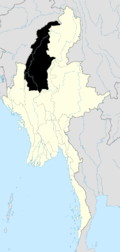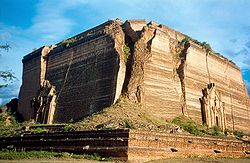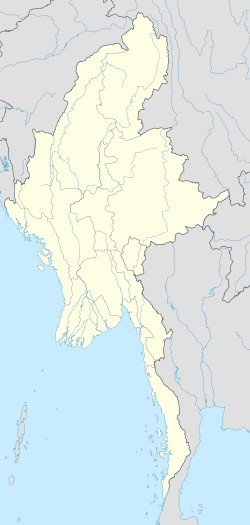- Mingun
-
Mingun
မင်းကွန်းမြို့Location in Burma Coordinates: 22°03′N 96°01′E / 22.05°N 96.017°E Country  Burma
BurmaRegion Sagaing Region District Township Time zone MST (UTC+7) Mingun (Burmese: မင်းကွန်းမြို့; MLCTS: mang: kwan mrui., pronounced [mɪ́ɴɡʊ́ɴ mjo̯]) is a town in Sagaing Region, northwest Myanmar (Burma), located 11 km up the Ayeyarwady River on the west bank from Mandalay. Its main attraction is the ruined Mingun Pahtodawgyi.
Contents
Mingun Pahtodawgyi
The Mingun temple is a monumental uncompleted stupa began by King Bodawpaya in 1790. It was not completed, due to an astrologer claiming that, once the temple was finished, the king would die.[citation needed] The completed stupa would have been the largest in the world at 150 meters. Huge cracks are visible on the structure from the earthquake of 23 March 1839,[1] Like many large pagodas in Myanmar, a Pondaw paya or working model of the stupa can be seen nearby.
King Bodawpaya also had a gigantic bell cast to go with his huge stupa, the Mingun Bell weighing 90 tons, and is today the largest ringing bell in the world. The weight of the bell in Burmese measurement, is 55,555 viss or peiktha (1 viss = 1.63 kg), handed down as a mnemonic "Min Hpyu Hman Hman Pyaw", with the consonants representing the number 5 in Burmese astronomy and numerology. [2][3]
Hsinphyumae Pagoda
Main article: Hsinphyumae PagodaJust a couple of hundred yards from the great stupa and bell lies the beautiful white Hsinbyume or Myatheindan Pagoda with a distinctive architectural style modelled after the mythical Myinmo taung or Mount Meru, built in 1816 by Bodawpaya's grandson and successor Bagyidaw and dedicated to the memory of his first consort Princess Hsinbyume (Lady of the White Elephant, granddaughter of Bodawpaya, 1789–1812) who died in childbed.[4][5]
-
Nun on alms round, Mingun Paya, Myanmar Courtesy: http://www.whileseated.org
See also
References
- ^ Burma:Preservation and restoration of national monuments and artifacts at selected sites, pages 5 and 9, UNESCO, Paris, 1984.
- ^ "The World's Three Largest Bells". Blagovest Bells. http://www.russianbells.com/interest/biggest.html. Retrieved 2007-03-15.
- ^ "The Mingun Bell". Myanmar's Net Inc.. http://www.myanmars.net/myanmar-museum/largest-ringing-bell.htm. Retrieved 2007-03-15.
- ^ "Colonel Sladen's Account of Senbyoo Pagoda at Mengoon, 1868". SOAS. Archived from the original on 2007-06-14. http://web.archive.org/web/20070614230745/http://web.soas.ac.uk/burma/2.1+pdf+files/2.1+03+sladen.pdf. Retrieved 2007-03-15.
- ^ Buyers, Christopher. "The Royal Ark: Burma - Konbaung Dynasty". http://www.4dw.net/royalark/Burma/konbau11.htm. Retrieved 2007-03-15.
External links
- Wanderings in Burma by George W Bird, 1897 F J Bright & Son, London, pp 316A, 318, 318A, 320A inc. old photos of Mingun by Signor Beaton of Mandalay
- Col Henry Yule's Remarks on the Senbyu Pagoda at Mengun, 1869 SOAS
- The Art and Culture of Burma: The Konbaung Period - Amarapura Dr. Richard M. Cooler, Northern Illinois University
- A Trip to Mingun GLOBOsapiens.net, December 26, 2006
Coordinates: 22°03′N 96°01′E / 22.05°N 96.017°E
Sagaing Region Capital: Sagaing Hkamti District 

Kale District Katha District Mawlaik District Monywa District Ayadaw Township (Ayadaw) · Budalin Township ( Budalin) · Chaung-U Township ( Chaung-U) · Kani Township (Kani) · Monywa Township (Monywa) · Pale Township (Pale) · Salingyi Township (Salingyi) · Tabayin Township (Tabayin) · Yinmabin Township (Yinmabin)Sagaing District Shwebo District Tamu District Naga Self-Administered Zone Categories:- Populated places in Sagaing Region
- Buildings and structures in Burma
Wikimedia Foundation. 2010.






